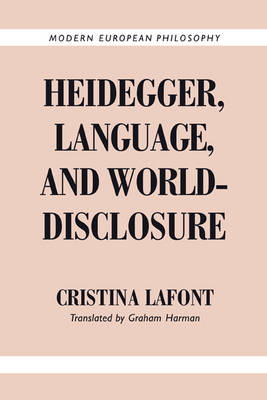
Heidegger, Language, and World-Disclosure
Seiten
2000
Cambridge University Press (Verlag)
978-0-521-66247-5 (ISBN)
Cambridge University Press (Verlag)
978-0-521-66247-5 (ISBN)
- Titel ist leider vergriffen;
keine Neuauflage - Artikel merken
A major contribution to the understanding of Heidegger (a rare attempt to bridge the schism between traditions of analytic and Continental philosophy), Lafont applies the core methodology of analytic philosophy, language analysis, to Heidegger's work providing both a clearer exegesis and a powerful critique of his approach to language.
This book is a major contribution to the understanding of Heidegger and a rare attempt to bridge the schism between traditions of analytic and Continental philosophy. Cristina Lafont applies the core methodology of analytic philosophy, language analysis, to Heidegger's work providing both a clearer exegesis and a powerful critique of his approach to the subject of language. In Part One, she explores the Heideggerean conception of language in depth. In Part Two, she draws on recent work from theorists of direct reference (Putnam, Donnellan and Kripke inter alia) to reveal the limitations of Heidegger's views and to show how language shapes our understanding of the world without making learning impossible. The book first appeared in German but has been substantially revised for the English edition.
This book is a major contribution to the understanding of Heidegger and a rare attempt to bridge the schism between traditions of analytic and Continental philosophy. Cristina Lafont applies the core methodology of analytic philosophy, language analysis, to Heidegger's work providing both a clearer exegesis and a powerful critique of his approach to the subject of language. In Part One, she explores the Heideggerean conception of language in depth. In Part Two, she draws on recent work from theorists of direct reference (Putnam, Donnellan and Kripke inter alia) to reveal the limitations of Heidegger's views and to show how language shapes our understanding of the world without making learning impossible. The book first appeared in German but has been substantially revised for the English edition.
Introduction: the linguistic turn in the German tradition of the philosophy of language; Part I. Heidegger's Conception of Language: 1. The role of language in Being and Time as the hidden root of the disclosedness of Dasein; 2. The role of language after the Kehre as the 'site' of world-disclosure; 3. World-disclosure and truth; Part II. The Structural Problems of Heidegger's Conception of Language: 4. The conception of meaning and reference implied by the ontological difference; 5. The A priori/A posteriori distinction implied by the ontological difference.
| Erscheint lt. Verlag | 28.8.2000 |
|---|---|
| Reihe/Serie | Modern European Philosophy |
| Übersetzer | Graham Harman |
| Verlagsort | Cambridge |
| Sprache | englisch |
| Maße | 162 x 239 mm |
| Gewicht | 576 g |
| Themenwelt | Geisteswissenschaften ► Philosophie ► Geschichte der Philosophie |
| Geisteswissenschaften ► Philosophie ► Philosophie der Neuzeit | |
| Geisteswissenschaften ► Philosophie ► Sprachphilosophie | |
| ISBN-10 | 0-521-66247-8 / 0521662478 |
| ISBN-13 | 978-0-521-66247-5 / 9780521662475 |
| Zustand | Neuware |
| Haben Sie eine Frage zum Produkt? |
Mehr entdecken
aus dem Bereich
aus dem Bereich
die kolonialen Wurzeln der französischen Theorie
Buch | Hardcover (2024)
Matthes & Seitz Berlin (Verlag)
CHF 41,90
oder Das Leben Montaignes in einer Frage und zwanzig Antworten
Buch | Softcover (2023)
C.H.Beck (Verlag)
CHF 25,20


